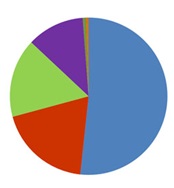Research Program Funding
Allocation of FY 2020–21 Research Funds

Funding Categories

Caltrans Functional Research | $16,766,000
The Caltrans functional research portfolio includes transportation research that addresses the areas of construction, design, environment, geotechnical/structures, maintenance, multimodal transport, pavement, planning, policy, programming, right-of-way, rural concerns, and transportation safety and mobility. Tasks are selected through the process described in the “Research Program Development” section and grouped by functional areas to align with Caltrans’ core programs
The following table shows the breakdown of research by functional area.
Distribution of Caltrans Functional Research by Research Area
| Funding | Research Area |
|---|---|
| $8,812,000 | Pavement |
| $2,655,000 | Geotechnical and Structures/Seismic |
| $1,276,000 | Transportation Safety and Mobility |
| $881,000 | Maintenance |
| $715,000 | Environmental |
| $644,000 | Modal |
| $503,000 | Advanced Research |
| $402,000 | Rural |
| $267,000 | Administration |
| $241,000 | Planning/Policy/Programming |
| $200,000 | Construction |
| $170,000 | Design |
| $16,766,000 | Total |

National Research Program | $6,189,000
Caltrans partners with national transportation organizations, including the TRB and the National Cooperative Highway Research Program (NCHRP). Caltrans benefits from national research efforts through leveraging research conducted at the national level and by serving on committees and panels that identify critical transportation issues, recommend project selection, and guide implementation.

State Research Support Partnerships (Research Centers) | $5,259,000
DRISI partners with university-based research centers to deliver research results and products. Each research center offers specialized technical expertise and state-of-the-art facilities, equipment, and materials.
- Advanced Highway Maintenance and Construction Technology Research Center (AHMCT)
- Pacific Earthquake Engineering Research Center Lifelines Program (PEER)
- Partners for Advanced Transportation Technology (PATH)
- University of California Pavement Research Center (UCPRC)

University Transportation Centers | $3,823,000
University transportation centers (UTC) are internationally recognized centers of excellence that are fully integrated within institutions of higher learning. The UTC program is administered by
the U.S. Department of Transportation (U.S. DOT). The program advances transportation technology and expertise through research, education, and technology transfer; provides a critical transportation knowledge base outside of the U.S. DOT; and addresses the workforce needs for the next generation of transportation leaders.
DRISI works in partnership with UTCs to identify, research, and develop solutions for California’s transportation challenges.
These five MAP-21 funded UTCs continue to conduct research initiated in prior years.
- METRANS Transportation Center
- Mineta National Transit Research Consortium
- National Center for Sustainable Transportation
- University of California Center on Economic Competitiveness in Transportation
- University of California Transportation Center
Caltrans awarded funds under the Fixing America's Surface Transportation (FAST) Act to these three UTCs:
- Mineta Consortium for Transportation Mobility
- National Center for Sustainable Transportation
- Pacific Southwest Region University Transportation Center

Technology Transfer and Implementation | $250,000
Promoting the implementation of research results into Caltrans routine practice requires multichannel, sustained technology transfer. DRISI uses various tools and methods to encourage the adoption of research results and products. These efforts include communication and engagement with DRISI customers and stakeholders.
Research products are the mechanism by which Caltrans is encouraged to make changes to business practices, with the goal of improving organizational effectiveness and efficiency. The research products are categorized by one or more of the following:
- New or improved technical standard, plan, or specification
- New or improved manual, handbook, guidelines, or training
- New or improved policy, rule, or regulation
- New or improved business practice, procedure, or process
- New or improved tool or equipment
- New or improved decision support tool, simulation, model, or algorithm (software)
- Processed data/database
- Evaluation of new commercial products to determine if they meet Caltrans’ needs
DRISI uses various methods to communicate research results and products. Activities include:
- Conferences and forums
- Demonstrations and training
- Meetings, presentations, and webinars
- Research events and workshops
- Support of products during initial stages of adoption
Print and web-based publications and materials include:
- Annual Research Program Highlights reports showcase activities and completed research.
- Final reports document the executed methodology, detailed findings, and technical analysis of the research tasks.
- Preliminary Investigation reports provide a comprehensive overview of historical and existing national and international research and best practices for defined research needs.
- Research Notes give an overview of research in progress to a general audience. Released at the beginning of a research task, the notes describe the need, methodology, goal, benefits, milestones, and next steps.
- Research Results communicate to a general audience what was accomplished with the research. They summarize the need, goal, methodology, outcome, and benefits.

Roadside Safety Research | $141,000
DRISI’s Roadside Safety Research group evaluates the crash worthiness of safety technology, including barriers, guardrails, crash cushions, bridge rails, sign supports, and other hardware. It conducts full-scale crash tests on roadside safety hardware designs developed by Caltrans to ensure that these designs comply with applicable crash performance criteria. The group also evaluates the crash worthiness of proprietary hardware developed by others to ensure that it is acceptable for use on state highways. The group provides support to Caltrans Legal Division in tort liability cases by conducting crash tests and delivering technical assessments and expert witness testimony.

